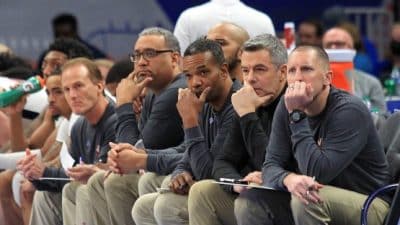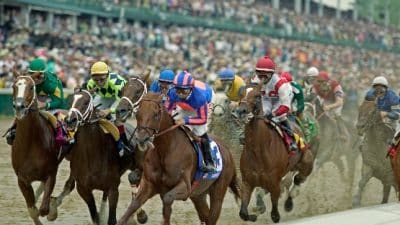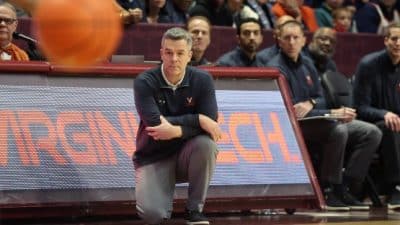
Virginia Attorney General Jason Miyares is taking a legal step that could help hasten the demise of the NCAA, announcing on Wednesday that he has filed a lawsuit alleging that the current NIL rules violate federal antitrust law.
They almost certainly do; beware the collateral damage.
“Student-athletes generate massive revenues for the NCAA, its members, and corporations within the college sports industry, especially in football and basketball,” said Miyares, a Republican, who, you might remember, had threatened litigation against the NCAA last fall over his alma mater, JMU, and outdated rules barring the football program from consideration for participation in the College Football Playoff.
“Student-athletes should have more freedom over negotiating and earning money for their skills and ability,” Miyares said. “Colleges and universities benefit dramatically from the success of their student-athletes – it’s only fair that student-athletes also get the full picture of how they may benefit from their choice of school as well.”
The suit is being filed in conjunction with Tennessee Attorney General Jonathan Skrmetti, a Republican whose motivation to get involved could include this week’s news that the University of Tennessee football program is in the NCAA’s crosshairs over possible Level 1 and Level 2 violations of NIL rules.
The crux of the lawsuit, filed today in a Tennessee federal court, is that the NCAA Is trying to stop the NIL market from functioning by banning prospective college athletes, including preps and transfers, “from discussing potential NIL opportunities before they actually enroll.”
“It’s like a coach looking for a new job, and freely talking to many different schools, but being unable to negotiate salary until after he’s picked one (the depressive effect on coaches’ wages in such a dysfunctional market is obvious),” the suit alleges.
“By prohibiting such interactions, the NCAA’s current approach restricts competition among schools and third parties (often NIL ‘collectives’) to arrange the best NIL opportunities for prospective athletes,” the suit alleges. “The NCAA bans the use of NIL contracts as a ‘recruiting inducement,’ meaning prospective athletes cannot negotiate NIL agreements before they commit to a member institution. A prospective athlete must commit, enroll, or transfer without understanding the NIL opportunities available at the destination or comparing those opportunities to the ones at competing schools. This NIL-recruiting ban limits competition and artificially decreases NIL compensation that college athletes could otherwise obtain in a free market.”
The NCAA is, no doubt, going to fight this tooth and nail, though the writing has been on the wall in regard to issues regarding compensation for student-athletes for several years now.
The concession by the NCAA and its member schools on NIL, which allows student-athletes to make what is essentially an outside salary, was intended to keep college athletics programs from having to bring athletes in as employees, and having to directly pay them salary and benefits.
If that happens, and it will, the only question is when, college programs will either have to have to substantially increase their revenues – by my estimate, roughly doubling their current budgets – or cut sports, with what we call Olympic sports, the euphemism used to describe the second-tier sports that don’t draw enough in ticket and TV revenues to pay their own bills, being the primary ones on the chopping block.
To this end, there was news last week involving Loyola Marymount, which announced that it will cut six varsity sports – men’s cross country, men’s rowing, men’s track and field, women’s rowing, women’s swimming and women’s track and field – as part of an effort to “adapt to the quickly changing NCAA landscape.”
“The NCAA landscape is changing rapidly, and schools of all sizes must adapt to provide the best student–athlete experience while becoming even more competitive. LMU is no different,” Loyola Marymount AD Craig Pintens said in a statement in a news release, in which it was noted that the decision from LMU “was reached after carefully considering various internal and external factors, including the transformational changes impacting college athletics nationally, from the advent of name, image, and likeness (NIL) to changing transfer rules to pending rulings on student-athletes as employees, among others.”
Expect more news releases like this one in the coming months and years, of course with football – note: Loyola Marymount doesn’t field a football team – and men’s basketball being held sacrosanct when it is time for ADs to make cuts, because those programs are the ones that make money.
College programs that do have football, which eats up 63 scholarships at the FCS level and 85 scholarships at the FBS level, will have to make more draconian cuts, starting with men’s sports outside of football and basketball, and likely also involving some of the bottom-rung women’s sports as well.
None of that is Jason Miyares’ fault; just want to make that clear here.
My sense of the relevant law here is that Miyares and Skrmetti have a good case here. The argument that they make, that the NCAA’s rules on NIL restrict the marketplace, seems sound.
The effect of this lawsuit, and others that are in the federal system, and still others that have yet to be formally filed, but are still to come, will change college athletics as we know it.
If there is even a college athletics as we could recognize it when this is all said and done.










